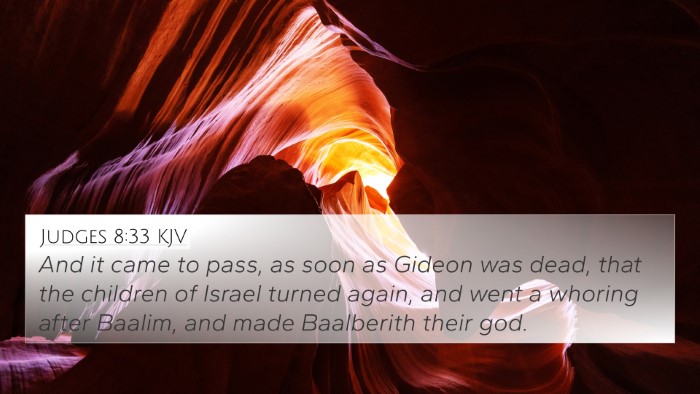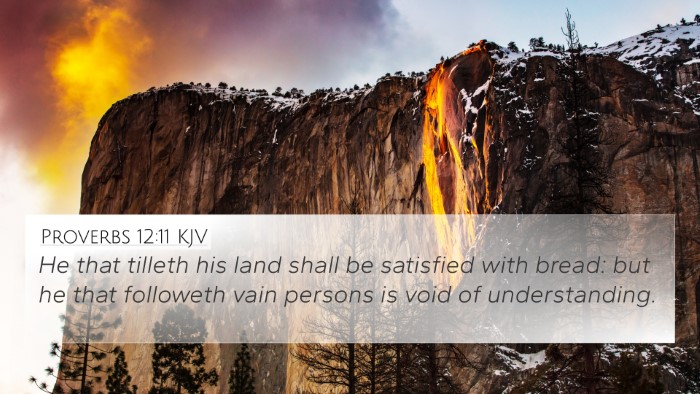Meaning and Interpretation of Judges 9:4
Judges 9:4 states: "And they gave him seventy shekels of silver out of the house of Baal-berith; and wherewith Abimelech hired vain and light persons which followed him." This verse paints a vivid picture of the political machinations surrounding Abimelech's rise to power, reflecting the corruption and moral degradation present at the time.
Contextual Background
In the broader context of the Book of Judges, the Israelites were experiencing cycles of apostasy, oppression, and deliverance. Abimelech, the son of Gideon, sought to establish himself as king after his father's death. His recruitment of "vain and light persons" indicates a deliberate choice to surround himself with unscrupulous individuals, highlighting the corrupted leadership emerging in Israel.
Commentary Insights
- Matthew Henry: Henry notes that the seventy shekels symbolize the blood money that would ultimately lead to Abimelech's downfall. His choice to hire ruthless individuals illustrates a departure from divine guidance, showcasing the dangerous path of self-serving ambition.
- Albert Barnes: Barnes emphasizes the significance of Abimelech's choice to use funds from Baal-berith’s treasury, symbolizing loyalty to false gods rather than to the people. The use of "vain and light persons" serves to underline the moral decay prevalent among the leaders of Israel at this time.
- Adam Clarke: Clarke provides a theological reflection, suggesting that the funding of Abimelech’s campaign from a pagan source indicates a serious apostasy among the Israelites. He highlights that the type of individuals Abimelech attracted reveals the nature of leadership and its impact on the nation.
Key Themes in Judges 9:4
This verse encapsulates several key themes:
- Apostasy: The alignment of Zionist politics with pagan practices signifies a severe breach of covenant with Yahweh.
- Corrupted Leadership: Abimelech's actions demonstrate how leaders can misuse their power and influence.
- Consequences of Unrighteous Alliances: The presence of "vain and light persons" as followers signifies how easily a leader can be swayed by the company they keep.
Bible Cross-References
Several Bible verses connect to Judges 9:4, elucidating its themes:
- 1 Samuel 8:5-7: The demand for a king reveals the people's desire for earthly leadership over divine sovereignty.
- Proverbs 28:16: "The prince that wanting understanding is also a great oppressor," echoing the dangers of foolish leadership.
- Matthew 7:15-20: The warning against false prophets aligns with the choice of "vain persons" serving Abimelech.
- Isaiah 30:1-3: God’s admonition against seeking help from Egypt parallels the Israelites' reliance on corrupt practices.
- Galatians 6:7: "For he that soweth to his flesh shall of the flesh reap corruption," reflecting the eventual consequences of Abimelech's corrupt means.
- Exodus 23:3: The directive against showing favor to the poor when judging emphasizes fairness and godliness in leadership.
- Romans 1:28-32: This passage illustrates a society that turns from God, resulting in depraved actions, akin to Abimelech's rise.
Inter-Biblical Dialogue
The narrative of Judges 9:4 engages in a broader dialogue within Scripture, allowing for a comparative analysis of leadership, moral integrity, and the consequences of straying from God’s commands:
- Leadership Dynamics: Comparing Abimelech's rise with David’s anointing in 1 Samuel 16 sheds light on the attributes of godly leadership versus self-serving ambition.
- Moral Decay: The patterns of sin seen in both Judges and Romans reflect the consistent theme of humanity’s rebellion against divine authority.
- Divine Sovereignty: The tension between human kingship and God's ultimate rule is articulated in both Old and New Testaments, calling for a deeper understanding of God’s plan.
Concluding Thoughts
The study of Judges 9:4 reveals the complexity of leadership, the perils of ungodly alliances, and the dire consequences of apostasy. The insights gleaned from public domain commentaries provide a comprehensive understanding of how this verse resonates throughout the entirety of Scripture, similar to themes present in a cross-referenced Bible study. Engaging with these Scriptures develops not only an understanding of the text but encourages deeper reflection on personal leadership and the moral decisions we face.










